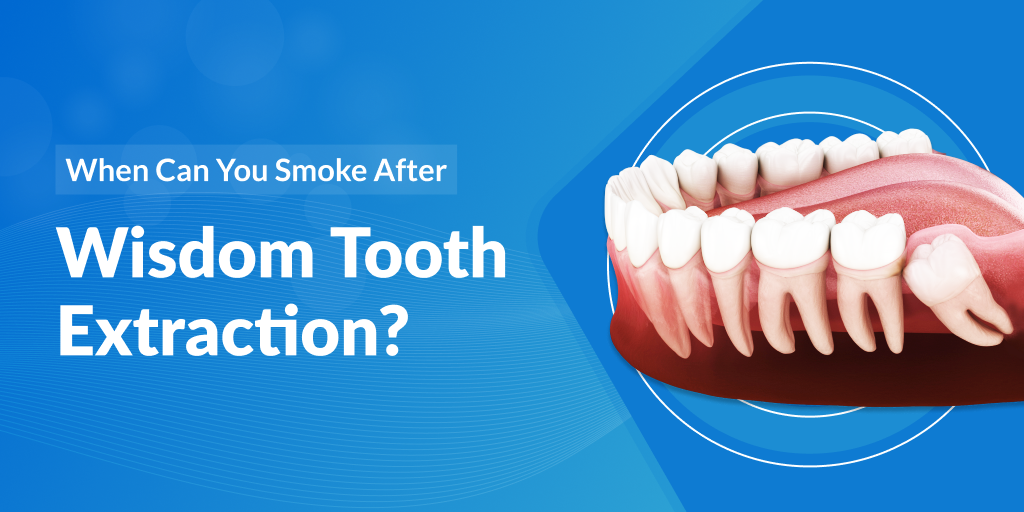Undergoing a wisdom tooth extraction can be a significant dental procedure that requires careful post-operative care to ensure a smooth and efficient healing process. One common question that arises among patients who smoke is, “When can I smoke after wisdom tooth extraction?” This concern is valid, considering the impact smoking can have on the healing process. In this article, we will explore the risks associated with smoking after wisdom tooth removal and provide guidelines to help you understand the best time to resume smoking, if you choose to do so.
Understanding the Healing Process
Before diving into specifics, let us understand the basic stages of healing following a wisdom tooth extraction. After the removal of a wisdom tooth, your body initiates a natural healing process that involves several critical stages. Initially, a blood clot forms in the socket to protect the exposed bone and nerves. This clot is a cornerstone of the healing process, as it serves as a foundation for the development of new bone and soft tissue over the extraction site.
In the days following the procedure, the body works diligently to repair the site. Within the first 24 to 48 hours, you may experience swelling, discomfort, and limited mouth opening, which gradually improve as healing progresses. It’s during this period that adherence to post-operative care instructions is crucial to avoid complications, such as dry socket, infections, and delayed healing.
The Impact of Smoking on Healing
Smoking after wisdom tooth extraction can severely compromise the healing process. The act of smoking not only introduces harmful chemicals into the mouth but also affects blood flow and oxygen delivery to the tissue, crucial for healing. Nicotine, a known vasoconstrictor, narrows blood vessels, reducing the blood supply to the surgical site, and delaying the healing process. Furthermore, the suction motion required to inhale smoke can dislodge the blood clot forming in the socket, leading to a painful condition known as dry socket.
Dry socket, or alveolar osteitis, occurs when the blood clot at the site of the extraction is prematurely removed or never forms adequately. This condition exposes the underlying bone and nerves, resulting in significant pain and a higher risk of infection. The absence of the clot can also prolong the healing process, as it removes the necessary foundation for new tissue growth.
Guidelines for Resuming Smoking
Given the risks, it is advisable to wait as long as possible before resuming smoking after a wisdom tooth extraction. The minimum recommended period is 72 hours (3 days), but extending this to at least a week is even better for your healing process. This timeframe allows the initial critical stages of healing to occur, including the formation and stabilization of the blood clot and the beginning of tissue regeneration.
If waiting this long is unfeasible for you, there are certain precautions you can take to minimize the risk of complications:
- Use Nicotine Patches: If nicotine withdrawal is a concern, consider using nicotine patches to manage cravings during the initial healing period. Consult with your dentist or physician for advice tailored to your health condition and smoking habits.
- Inhale Gently: If you choose to smoke, do so with minimal suction to avoid dislodging the blood clot. Consider loosening the cigarette filter to reduce the need for strong inhalation.
- Maintain Oral Hygiene: While you should avoid rigorous rinsing in the first 24 hours to protect the blood clot, maintaining oral hygiene is crucial. After 24 hours, gently rinse your mouth with warm salt water after smoking to help cleanse the area.
Alternatives to Smoking
Considering the significant risks associated with smoking after wisdom tooth extraction, exploring alternatives to manage nicotine cravings is advisable. Nicotine replacement therapies, such as patches, gum, or lozenges, can provide the nicotine your body craves without the harmful effects of smoke inhalation. Additionally, this period could serve as an opportunity to seek support for quitting smoking altogether, benefiting not only your oral health but your overall well-being.
While the desire to smoke after wisdom tooth extraction is understandable, it’s crucial to consider the implications on your healing process. By waiting at least 72 hours, ideally longer, and taking measures to minimize risks, you can aid your recovery and avoid painful complications.
At LA Dental Clinic, we offer a comprehensive range of dental services designed to meet all your oral health needs. Our team, led by the experienced Nasiry sisters, brings over 30 years of combined expertise to provide you with the highest quality of care. From cutting-edge Invisalign treatments and dental implants to flawless veneers, we ensure that your smile stands out for all the right reasons. We prioritize your comfort and satisfaction, utilizing the latest technology for effective and efficient treatments. Trust us to be your partner in achieving and maintaining a beautiful, healthy smile in the heart of Los Angeles.
